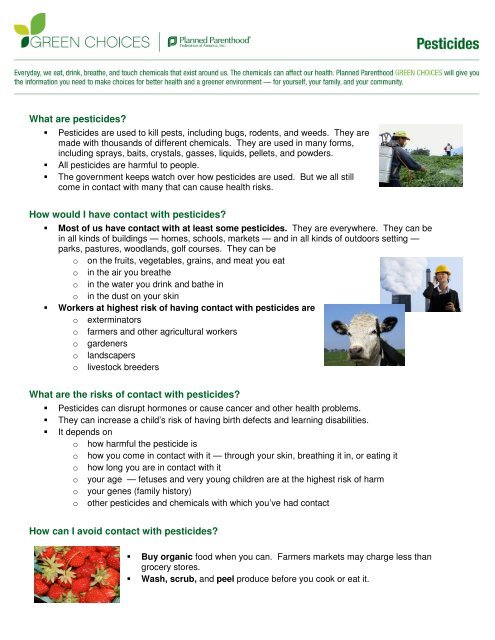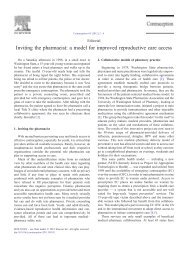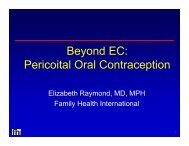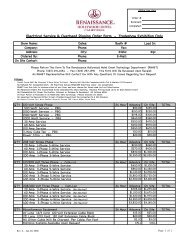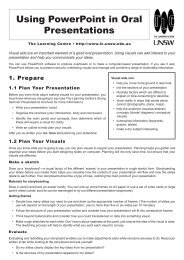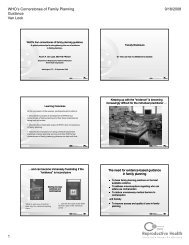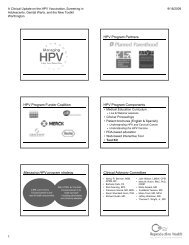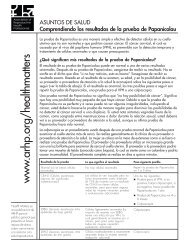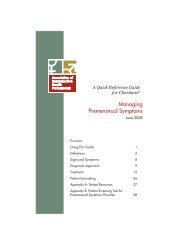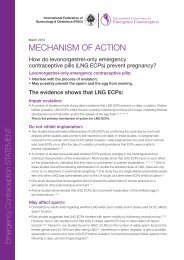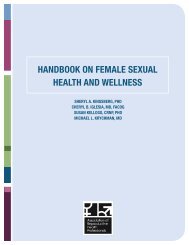What are pesticides? How would I have contact with pesticides ...
What are pesticides? How would I have contact with pesticides ...
What are pesticides? How would I have contact with pesticides ...
You also want an ePaper? Increase the reach of your titles
YUMPU automatically turns print PDFs into web optimized ePapers that Google loves.
<strong>What</strong> <strong>are</strong> <strong>pesticides</strong>?<br />
<br />
<br />
<br />
Pesticides <strong>are</strong> used to kill pests, including bugs, rodents, and weeds. They <strong>are</strong><br />
made <strong>with</strong> thousands of different chemicals. They <strong>are</strong> used in many forms,<br />
including sprays, baits, crystals, gasses, liquids, pellets, and powders.<br />
All <strong>pesticides</strong> <strong>are</strong> harmful to people.<br />
The government keeps watch over how <strong>pesticides</strong> <strong>are</strong> used. But we all still<br />
come in <strong>contact</strong> <strong>with</strong> many that can cause health risks.<br />
<strong>How</strong> <strong>would</strong> I <strong>have</strong> <strong>contact</strong> <strong>with</strong> <strong>pesticides</strong>?<br />
<br />
<br />
Most of us <strong>have</strong> <strong>contact</strong> <strong>with</strong> at least some <strong>pesticides</strong>. They <strong>are</strong> everywhere. They can be<br />
in all kinds of buildings — homes, schools, markets — and in all kinds of outdoors setting —<br />
parks, pastures, woodlands, golf courses. They can be<br />
o on the fruits, vegetables, grains, and meat you eat<br />
o in the air you breathe<br />
o in the water you drink and bathe in<br />
o in the dust on your skin<br />
Workers at highest risk of having <strong>contact</strong> <strong>with</strong> <strong>pesticides</strong> <strong>are</strong><br />
o exterminators<br />
o farmers and other agricultural workers<br />
o gardeners<br />
o landscapers<br />
o livestock breeders<br />
<strong>What</strong> <strong>are</strong> the risks of <strong>contact</strong> <strong>with</strong> <strong>pesticides</strong>?<br />
<br />
<br />
<br />
Pesticides can disrupt hormones or cause cancer and other health problems.<br />
They can increase a child’s risk of having birth defects and learning disabilities.<br />
It depends on<br />
o how harmful the pesticide is<br />
o how you come in <strong>contact</strong> <strong>with</strong> it — through your skin, breathing it in, or eating it<br />
o how long you <strong>are</strong> in <strong>contact</strong> <strong>with</strong> it<br />
o your age — fetuses and very young children <strong>are</strong> at the highest risk of harm<br />
o your genes (family history)<br />
o other <strong>pesticides</strong> and chemicals <strong>with</strong> which you’ve had <strong>contact</strong><br />
<strong>How</strong> can I avoid <strong>contact</strong> <strong>with</strong> <strong>pesticides</strong>?<br />
<br />
<br />
Buy organic food when you can. Farmers markets may charge less than<br />
grocery stores.<br />
Wash, scrub, and peel produce before you cook or eat it.
Don’t spray <strong>pesticides</strong> indoors, in the garden, or on pets. Keep pests out of your home by<br />
sealing cracks and holes around doors, windows, and baseboards. Keep food in sealed<br />
containers.<br />
If you work <strong>with</strong> <strong>pesticides</strong>, change out of your work clothes and shoes before you go into<br />
your home. And be sure to wash your hands frequently and shower before you <strong>are</strong> near<br />
others.<br />
Use baits and traps instead of pesticide sprays, powders, or strips. Go to:<br />
www.pesticide.org/factsheets.html#alternatives<br />
Brush children’s hair <strong>with</strong> a metal lice comb to stop the spread of lice instead of using<br />
chemicals. www.epa.gov/<strong>pesticides</strong>/ipm/schoolipm/chap-11.pdf<br />
Where can I get more information about pesticide exposure?<br />
Beyond Pesticides: www.beyond<strong>pesticides</strong>.org<br />
National Pesticide Information Center: npic.orst.edu/tech.htm or 1-800-858-7378<br />
U.S. Department of Labor Occupational Safety and Health Administration: www.osha.gov<br />
U.S. Environmental Protection Agency — Office of Pesticides: www.epa.gov/<strong>pesticides</strong><br />
In an emergency, call the National Poison Control Hotline at 1-800-222-1222<br />
Green Choices information is also online: www.plannedp<strong>are</strong>nthood.org/greenchoices


